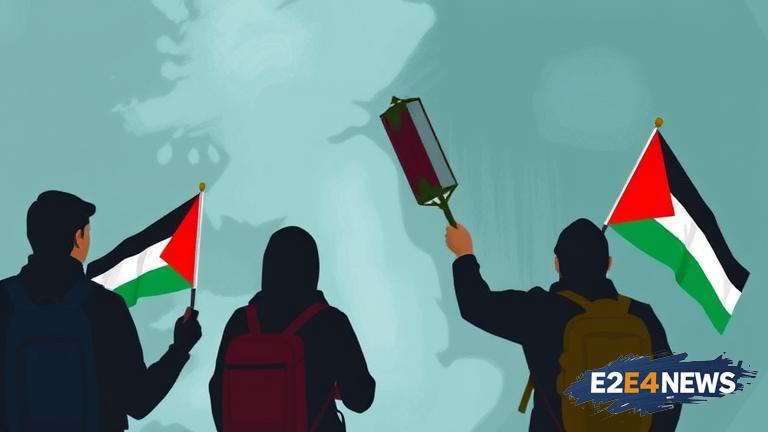The UK government’s decision to ban Palestine Action, a pro-Palestinian activist group, has sparked widespread concern and criticism. The ban, which was announced under the Terrorism Act 2000, has been condemned by human rights groups and activists, who argue that it is a misuse of counter-terrorism legislation. The ban is seen as a disturbing trend, with many warning that it could have far-reaching implications for freedom of speech and the right to protest. Palestine Action has been vocal in its criticism of Israel’s treatment of Palestinians, and has organized numerous protests and demonstrations across the UK. The group has also been involved in direct action, including occupying and damaging property belonging to companies accused of complicity in Israeli war crimes. The UK government has accused Palestine Action of promoting terrorism and anti-Semitism, but critics argue that this is a gross misrepresentation of the group’s activities and goals. Many have pointed out that Palestine Action’s actions are a legitimate form of protest and activism, and that the ban is an attempt to silence and intimidate those who speak out against Israeli human rights abuses. The ban has been condemned by Amnesty International, which has warned that it could have a chilling effect on freedom of speech and the right to protest. The human rights group has also expressed concern over the broad and vague definition of terrorism used in the ban, which could be used to target other activist groups and individuals. The UK’s counter-terrorism legislation has been criticized for being overly broad and vague, with many arguing that it is being used to suppress dissent and silence marginalized communities. The ban on Palestine Action is seen as a prime example of this, with many warning that it could be used to set a precedent for further restrictions on freedom of speech and the right to protest. The UK government has faced criticism for its handling of the situation, with many arguing that it has failed to provide sufficient evidence to justify the ban. The government has also been accused of hypocrisy, given its vocal support for freedom of speech and the right to protest in other contexts. The ban has sparked widespread outrage and condemnation, with many taking to social media to express their opposition. Protests and demonstrations have also been organized across the UK, with activists and supporters of Palestine Action calling for the ban to be lifted. The situation has also sparked a wider debate over the UK’s relationship with Israel, with many arguing that the ban is a reflection of the UK government’s close ties with the Israeli government. Critics have argued that the UK government is more interested in protecting the interests of the Israeli government than in upholding the rights of its own citizens. The ban on Palestine Action has also raised concerns over the impact on the Palestinian community in the UK, with many arguing that it could exacerbate existing feelings of marginalization and exclusion. The situation has also sparked a wider debate over the role of activism and protest in bringing about social change, with many arguing that the ban is an attempt to suppress and intimidate those who are working to bring about justice and equality. Despite the ban, Palestine Action has vowed to continue its activism and protest, with many supporters and activists pledging to continue the fight for justice and equality. The situation remains ongoing, with many waiting to see how the UK government will respond to the widespread criticism and condemnation. In the meantime, the ban on Palestine Action remains a disturbing example of the misuse of counter-terrorism legislation, and a warning sign for the future of freedom of speech and the right to protest in the UK.
